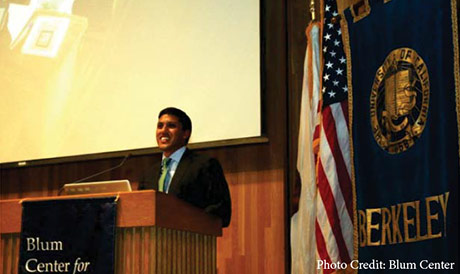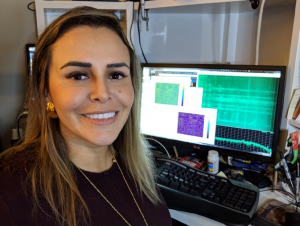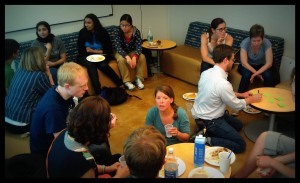Author:
Javier Kordi
On October 10th, the Blum Center received national attention: Rajiv Shah, the administrator of the U.S. Agency for International Development (USAID) ventured across the country to meet with the UC Berkeley community. The Blum Center was honored to host Director Shah, as he spent the day engaging with students, meeting faculty and board members, and learning about the latest initiatives in poverty alleviation.
Dr. Shah’s visit marked the first in what will be a continued, symbiotic partnership between the federal agency and the Blum Center. Towards the end of his visit, he delivered a keynote address to an overflowing audience of students, professors, and community members. Dr. Shah praised the center’s focus on “deep analysis and broad engagement… that not only generates new ideas, but also tests and applies real-world solutions.” He noted the uniqueness of the Blum Center’s approach, which combines topdown efforts with empowerment and sustainability from the ground-up.
In his speech, Dr. Shah noted his interest in solutions such as the WE CARE Solar Suitcase and the Cell Scope. With their respective abilities to curb infant mortality and facilitate early disease diagnosis in rural areas, these initiatives are a sampling of the promise of university-level development to help the poor. Dr. Shah explained that the process of interdisciplinary collaboration that birthed these projects now serves as “the model for a network of development laboratories [USAID] is forming across the country.”
 The next era in poverty alleviation will be defined by an open-source approach to development that breaks down barriers limiting the availability of the latest innovations. The opensource paradigm holds the key to implementing sustainable and replicable real-world solutions. An example Dr. Shah mentioned was a mobile phone equipped with geographic information system capabilities. Made readily available to the hands of vulnerable populations, this device would allow atrocity victims to record critical information (such as time, place, and photographs) to be used as substantive evidence in international courts.
The next era in poverty alleviation will be defined by an open-source approach to development that breaks down barriers limiting the availability of the latest innovations. The opensource paradigm holds the key to implementing sustainable and replicable real-world solutions. An example Dr. Shah mentioned was a mobile phone equipped with geographic information system capabilities. Made readily available to the hands of vulnerable populations, this device would allow atrocity victims to record critical information (such as time, place, and photographs) to be used as substantive evidence in international courts.
USAID understands that even the most brilliant technologies are mere tools— without a solid implementation platform, their impacts are limited. For its projects to succeed, an organization must have a fluid ideology that can operate within the varying landscapes and climates of development. This requires a lively discourse on the methods and approaches to development. On university campuses, the conversation is ever-growing, and USAID wants to join in. According to Dr. Shah, USAID aims to spark a dialogue with the millennial generation of activists and scholars emerging from places like UC Berkeley. In pursuit of this goal, USAID has created an online-space called USAID Fall Semester which seeks to invite students to converse, critique, and collaborate with the organization.
Dr. Shah ended his speech with an inspirational call to action— stating that extreme poverty could be reduced by 90% if efforts were accelerated. He then opened the floor to questions, and a lively conversation ensued. It was a day to be remembered for the students and faculty at UC Berkeley. As the Blum Center’s model is replicated and leveraged, with new partnerships across people, institutions, and ideas— a new chapter in the fight against poverty begins.





